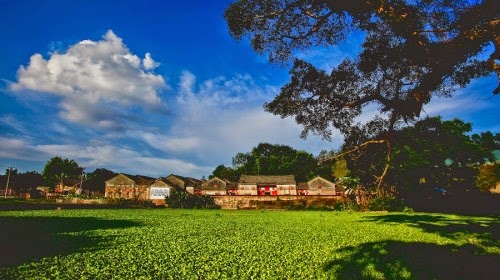The enchanting
rivers, lush bamboo trees, gigantic banyan trees, ancient buildings, fishing
boats and distinctive waterwheels contribute to the beauty of the village,
while the rich culture also adds charm to it. Sauntering in the enchanting village,
you will easily drink in the centuries-old culture of the Sui Family, and the
antiquity and simplicity of the Hakka people.
Yingqin (Welcoming
Tourists) Bridge, a must seen spot of the village, represents the hospitality
of the inhabitants towards their visitors. Standing on the bridge you can see
the whole village, a group of square buildings in Ming (1368-1644) and Qing
Dynasties' (1644-1911) style. The perfect drainage system of the constructions
made the village survive heavy rainfall.
Hakka Marital Customs
Teasing the bride
on her wedding night is a typical marital custom of the Hakka Village
Hakka Round-Dragon House
The Round-Dragon
House is a typical Hakka residence with the architectural characteristics of Central China . The Round-Dragon Houses of Suijiawei
Village resemble a grand circle. In the past, to withstand the unfriendly
intruders, the Hakka people lived together and constructed their houses in the
style of a castle.
Yongsi Memorial Hall
The oldest house,
called the Yongsi Memorial Hall, was built in 1481 in memory of Su Dongshan, the eighth-generation
descendant of Su Dongpo and as a place for the villagers to worship their
ancestors and discuss important affairs.
Su Ancestral Memorial Hall
The Su Ancestral
Memorial Hall, with a history of over 470 years, once had an array of
significant cultural relics of the Su Family. The existing plaques, which were
given by the emperors, provide an idea of the past glory and resplendence of
the Sujiawei Village
After visiting the
ancient houses, visitors can take a walk along the Dongjiang River
For more
information, please visit www.top-chinatour.com





No comments:
Post a Comment